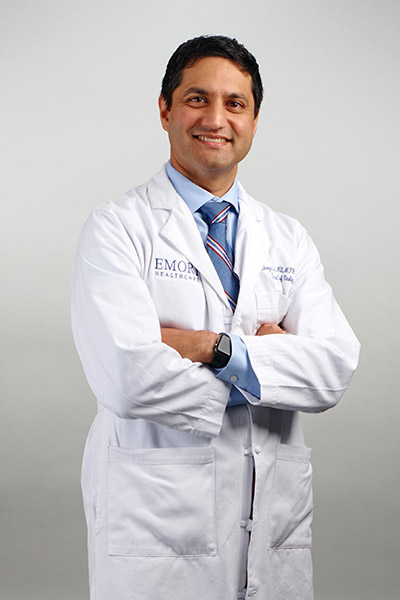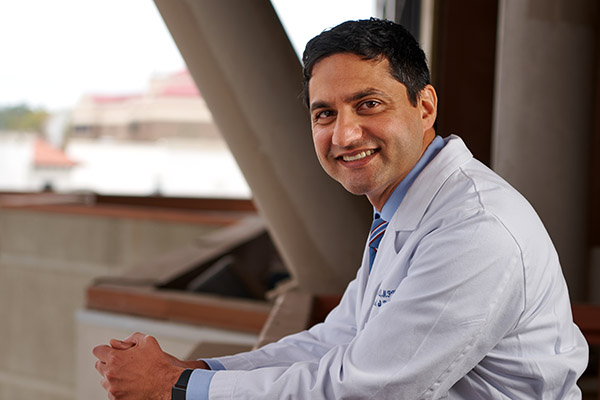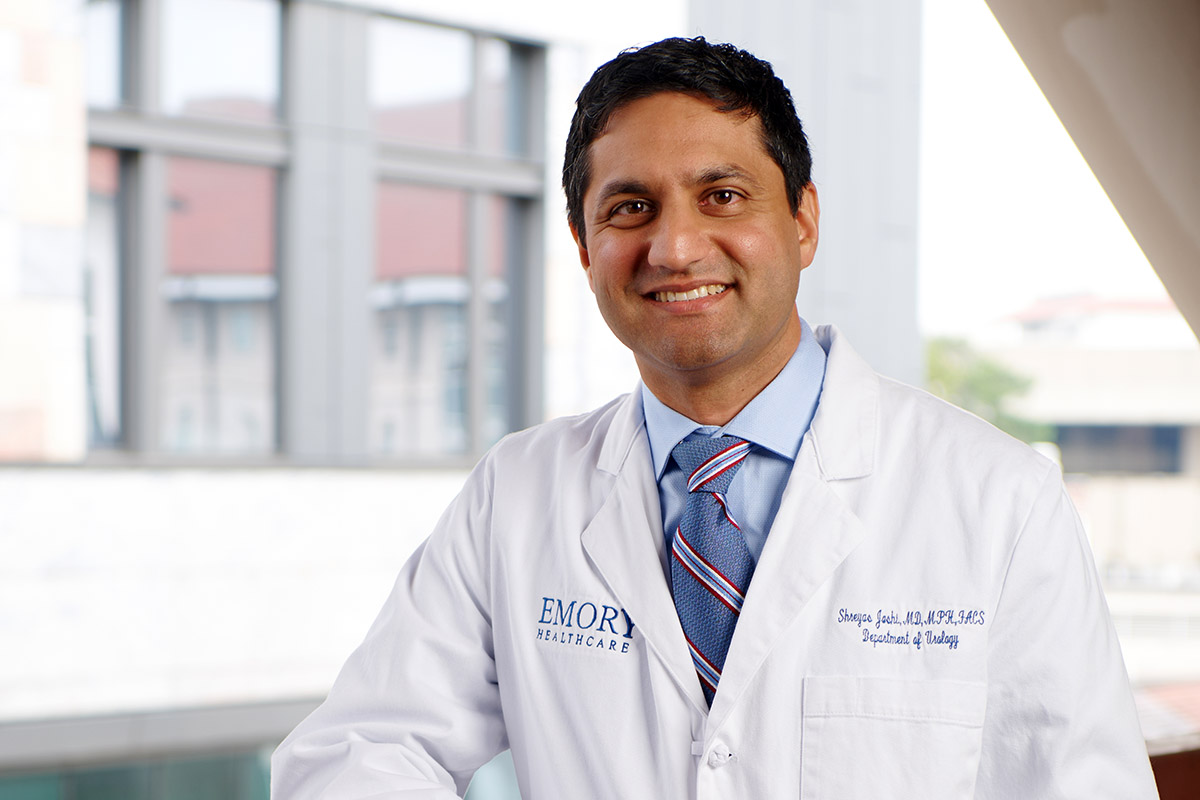The work that we do from the lab and with industry partners directly translates into giving treatments to patients who are coming here and have no other real hope for managing their really aggressive bladder cancers.
Finding Hope in Patients’ Outcomes

Shreyas Joshi, MD, MPH, is a urologic oncologist at Winship Cancer Institute of Emory University, and director of the Bladder Cancer Program in the Department of Urology at Emory University School of Medicine. He specializes in managing complex urologic cancers using open, laparoscopic and robotic approaches to prostate, bladder and kidney cancers.
“There really aren’t many other places treating advanced bladder cancer the way we are,” Joshi says. From the lab to the surgical suite, he says that much of Winship’s bladder cancer team’s work is about basic and translational science that lead to clinical trials. “That means that the work that we do from the lab and with industry partners directly translates into giving treatments to patients who are coming here and have no other real hope for managing their really aggressive bladder cancers.”
Bladder cancer is a cancer of the inner lining of the bladder, the urothelium. It’s also known as urothelial cell carcinoma or transitional cell carcinoma. “Usually, patients find out that they have bladder cancer after they notice some blood in the urine,” Joshi explains. “That should prompt some sort of evaluation by a physician.” Common risk factors for bladder cancer include being older, male and smoking tobacco. Although not as common, women with bladder cancer tend to be diagnosed at a later stage. “If you’re a smoker,” Joshi says, “and you are above the age of 50, and the doctor tells you that you have microscopic blood in the urine, that is something that we should look into to make sure you don’t have some evidence of early bladder cancer.”
Bladder cancer center of excellence
One important contribution Joshi says Winship has made in the bladder cancer field is “to be one of the main sites in the country — in the world, really — that has trialed a lot of the new gene therapies that are coming out for high-risk non-muscle invasive bladder cancers.” In fact, Winship was among the top sites for most of the gene therapy trials. “We’ve been at the forefront of that entire revolution, and we will continue to put patients on these really important clinical trials and hopefully find new breakthrough treatments as we continue along with this.”
One of the first gene therapies for bladder cancer approved by the FDA is a drug called nadofaragene. Joshi says, “This drug was approved based on the hard work of our team — and of course the patients who were willing to be on this trial to understand the effectiveness of this drug. Because of those outcomes, the FDA approved the therapy, and it is now being administered at many treatment centers. Winship is among the sites offering this therapy, with the hope that it can help some patients avoid bladder removal surgery, known as cystectomy. For those patients, the treatment could be a bladder-sparing alternative, an outcome made possible by the effort we put into this trial, which is now making a real difference in patients’ lives.”
Joshi calls Winship a “bladder cancer center of excellence.” He explains, “What I’m really saying is that we can manage patients at any point from the time they first notice blood in their urine to the other end of the spectrum where they unfortunately have advanced bladder cancer and we’re looking for treatment options that can help control their cancer and improve their quality of life in their final stages.”
Winship has the highest volume of bladder removals in the state, possibly the region, because, Joshi says, “we’re referred so many of the high-risk, advanced cases.” He adds, however, “That means that we also have the expertise to get patients through these difficult surgeries, and we have the support staff in place to help them recover well.”
An entire team thinking about them

“When I think of someone who comes to us in clinic,” Joshi says,“they have probably seen multiple other physicians and been to several different hospitals. And they have a bad problem. Their cancer is usually on the more advanced side.”
From their first meeting, Joshi says he wants patients to know they have an entire team on their side — including medical oncologists, radiation oncologists, pathologists, radiologists, nuclear medicine specialists, geneticists and interventional radiologists. “Their cancer is important to us, and while I may be just one person talking to them, I bring the weight of the team behind me.” He adds, “I hope that patients and their families, when they come to us, sense that it’s an entire team thinking about them and thinking about the best ways to manage their difficult cancers.”
Joshi says he is most inspired by the camaraderie he finds among the different specialists he works with. “Since I’ve come here, I know the main genitourinary oncology faculty from every single subspecialty, Dr. Vikram Narayan and Dr. Valentina Grajales in urologic oncology, Dr. Jacqueline Brown in medical oncology, Dr. Ashesh Jani in radiation oncology and others. We work very closely together. We have very robust discussions at our tumor boards and our multidisciplinary conferences.” He says this supports his own growth as a physician and is important for trainees as well “to create the best doctors we can to treat these kinds of conditions moving forward.”
“Where science becomes hope” comes to life for Joshi in his patients’ outcomes. “When you come into clinic or you see your post-operative patient and they’re doing well, and they’re thriving — or they’re finally recovering and getting the quality of life back and their cancer is managed — I think that is a feeling that you can get here at Winship that is difficult to obtain without the resources that we have. That really helps me be excited to come to work and see those patient outcomes.”
Winship is where science becomes hope.
Who have you observed inspiring hope in our patients, our team or our community? We would love to hear from you. If you have a story to share about someone inspiring hope at Winship, reach out to us using this form.

